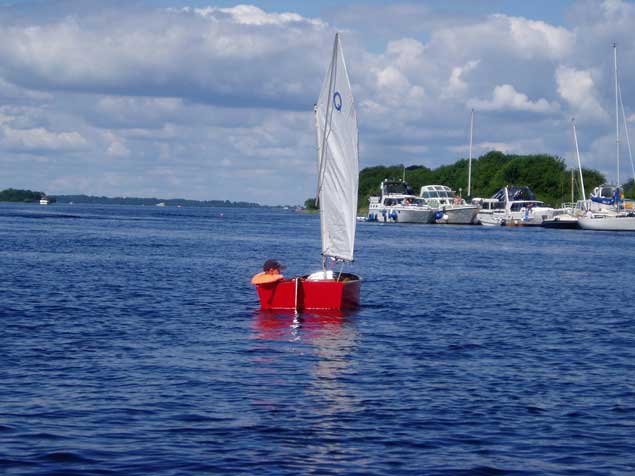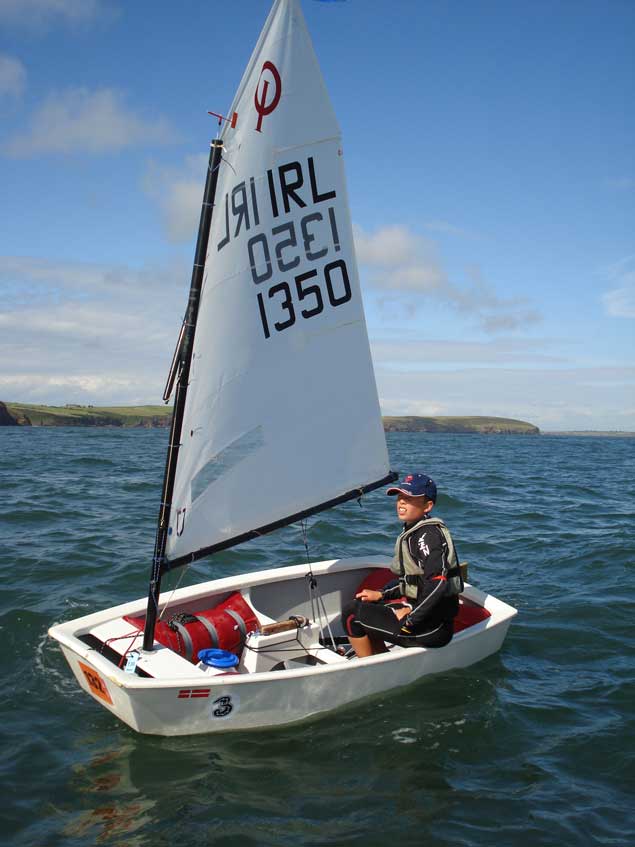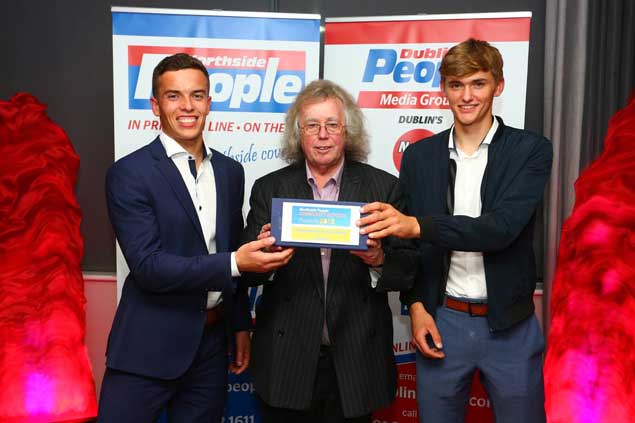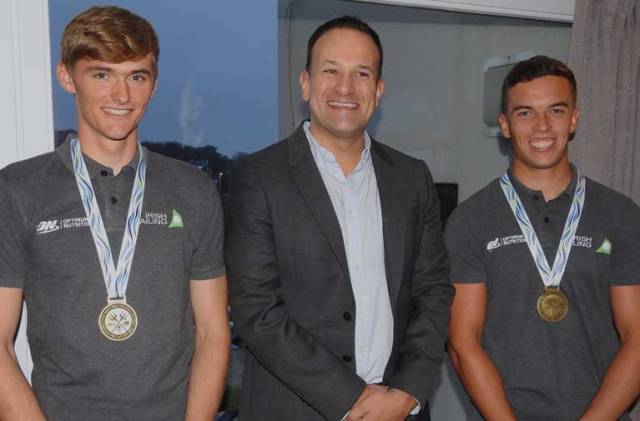If it wasn’t for their habit of appearing in national media reports following major competition success over the past few years, one might think that Robert Dickson and Sean Waddilove’s sailing campaigns have been deliberately shrouded in secrecy to protect and preserve a secret weapon until ready to reveal. But anyone who knows the Irish 49er Olympic hopefuls knows their reticence and ability to avoid the limelight is more a product of their inherent quiet charm and understated focus on the real prize.
Winning the 49er U23 Junior World Championships in September this year was a massive endorsement of the determination of the Howth and Skerries duo, catapulting them into the limelight of international sailing and to attention that they surely enjoy, albeit without self-promotional fanfare. Robert and Sean recognise that their gradual progression to the top of international competition changes the rules of engagement in respect of their previously ‘covert’ media presence and they realise that they are now of interest to many sailing and sporting followers.
 Rob's first Optimist Little Rosie
Rob's first Optimist Little Rosie
Like the thousands of people who first learn about the sport, Robert and Sean began their sailing in Optimists. With a long and successful history of sailing in the Dickson family, Robert was destined to get his feet wet in dinghies and even by the tender age of six, had already secured his first boat and started sailing his bright red Optimist named ‘Little Rosie’, which was named with the help of some influence from his grandfather Roy, who’s all-conquering Corby 40 ‘Cracklin Rosie’ had won the 1996 Boat of the Year close to the time that Robert was born. Blessed with a nautical genealogy that must give any renowned sailing family a run for their money, Robert began racing and competing in his Optimist in Lough Ree alongside his older cousins and siblings including Cormac Dickson whom he followed around the course to ensure that he found the right marks and Cillian who later successfully progressed to keelboat racing and some stellar international results with the K25 team on the J24 Kilcullen. Always bound to be part of the IODAI circuit and encouraged to do so by his Uncle David, Robert soon found himself at the front end of the Optimist fleet on the circuit and joining the ISA Squads to international competition including events in the UK, Germany and Spain. Like many other young sailors who have sailed at Sutton Dinghy Club, he also spent some time racing in the Mirror Class, winning the 2012 Southerns and the 2014 Eastern Championships. Robert is naturally at home and intensely focused when at the helm of his boat and when asked about his favourite place to race he is quick to state: ‘Once the gun goes, I could be sailing anywhere!’ However, he does hold a fondness for sailing in Spiddal – certainly the centre of gravity in the West of Ireland for the 420 Class, where he asserts is ‘the best place I’ve ever sailed’.
 Sean in his Oppie
Sean in his Oppie
Sean Waddilove started his sailing in Skerries and like Robert, he got the opportunity to get his feet wet in Optimists at an early age and in his own boat at 7 years of age. His mother Lucy (Coleman) has a long connection with Skerries, her family has lived in the seaside town for more than 5 generations. She met her husband Cliff while working in the Middle East and they came home to live in Skerries and to raise a family of five children amongst her many friends and family in the North County Dublin town. Despite having very little history of sailing in their families, Cliff and Lucy joined the ‘local trend’ by enrolling Sean in a ‘Taste of Sailing’ course in Skerries Sailing Club, where he and his friends took part in the ISA’s successful introductory dinghy course for children. Sean wasted no time in warming to the sport and enthused by his ‘Taste of Sailing’ experience, he continued to sail his Optimist into the Autumn after school and at weekends. Cliff remarks in respect of Sean’s early emerging talent ‘Not being a sailor nor appreciating what I was watching, the pivotal moment for me was when one of my sailing friends told me that Sean really stood out amongst the other sailors and that he clearly had a natural talent for the sport’. When you realise that Sean’s youngest sister Lucy is currently on the Irish Gymnastics Development Squad, you might understand that the Waddilove family are quick to act on and encourage their children’s talents and Sean’s progression through the Optimist ranks and onto the ISA Development was helped by their attentive recognition and support.
Following many years of racing in this competitive class, one of Sean’s final events in his Optimist was the India International Regatta, when he travelled east with his coach Thomas Chaix and was given the opportunity of an incredible experience for a 14-year-old, no doubt whetting his appetite for competition and travel for his years to come. He explains: ‘Anyone who gets the opportunity to attend this event should definitely go. It’s not just the sailing, but to see and experience a culture so completely different to Ireland and Europe.’
One of the toughest decisions for many a talented Optimist racing sailor who inevitably outgrows his trusty craft, is whether to continue on the single-handed pathway in something like a Laser or to step into a double-handed boat like the Feva or 420. Sean spent much of 2011 in the Royal St George Yacht Club assessing these options and following some advice from his former coach Thomas Chaix who advised that if the wrong initial choice was made, it would be easier to change from racing 420s to Lasers rather than the other way around, Sean took the step into the 420 and joined Robert whom he knew well and had raced against and travelled with in the Optimist circuit. They then became part of the ISA’s 420 squad that was clearly going to be a step to prepare the young sailors for the potential of high-performance and possibly even Olympic competition. But starting to race a new boat can present a rude awakening for a sailor at any level and Sean remembers: ’Just because you were good in the Oppie does not necessarily mean you will be good in the 420. The skills required, especially for crewing, are completely different. If I‘m honest, the Oppie didn’t prepare me really at all for crewing. It was like starting from scratch again’.
Training under ISA coach Ross Killian and also with Graeme Grant in what their home club at Howth Yacht Club, Robert and Sean wasted no time in getting up to speed and competed regularly over the next three years in major international championships with a host of top-twenty results leading to their winning the ISA Youth Nationals on Lough Derg in 2013 and again and in some style in Howth in 2014.
Following a trail already paved by Alan Ruigrok who had lived and trained in his Laser at La Rochelle a few years earlier, they seized an opportunity to move to La Rochelle for their Transition Year in August 2014 and to school in Lyceé Jean Dautet – a brave decision for two 15-year-old sailors, but one that would allow them to avail of France’s excellent youth sailing development programme and would see them training under their coach Philippe Boudgourd and joining with the La Rochelle 420 Squad at least 3-days-a-week on the water with additional days ashore during all of that school year. Taking time to manage occasional trips back home to compete in Irish championships, they also spent many of their weekends in France travelling to and competing in events in Maubisson, Brest and Sable D’Olonne. Robert and Sean acknowledge that their decision to spend the year in France was crucial in building their pathway programme and was a major turning point and step up to competing with national and international competition at an important stage of their development.
When they returned in 2015, they were invited by the ISA to join with the 49er Development Squad as part of a preparation programme for the 2020 Olympic Games in Tokyo. They bought a boat in Weymouth and launched it in Howth on the 8th March. Not the easiest boat to step into (or onto!), the first year seemed more like a swimming lesson mixed with a crash course in engineering and DIY – the 49er is a difficult beast for newcomers to tame. The extra power of the boat over the 420 is not easy to quickly adapt to, but by their own determination and with help from their Polish coach Tytus Konarzewski they began to make considerable progress by the end of the year.
The 49er training was done mainly with other two teams (Sean and Tadgh Donnelly and Mark Hasset and Oisín O’Driscoll) whom had already done the swimming and DIY ‘penance’ during the previous year and the Development Group’s training regime was facilitated in Howth, Dun Laoghaire and Schull. Both boys were now in their final two years of school and preparing for their Leaving Certificate exams, so their schedule became much more intensive with the additional but now compulsory gym-sessions with Mark McCabe, their Strength and Conditioning Coach and they would wake up for at 5am twice a week, cycle into the city centre for their 6am start and then cycle back home for breakfast and off to school. Robert would also manage to play Frisbee at 8am before school started!
During Easter 2016 and as they were approaching their Leaving Certificate exams, they travelled to Palma to race in an event and were there to see teammates Ryan Seaton and Matt McGovern win the regatta. This event was to demonstrate to Robert and Sean the level of competition that they would now be facing and included America’s Cup sailor Nathan Outteridge beside them on the beach, whose entourage included a team of 4 professionals specifically to set up his boat and manage logistics.
2017 was a very busy year for their 49er campaign and saw them cover more than 16000km as they travelled internationally to and from their training camps and events. Robert had started college in DCU to study Sports Science and Health where his schedule is supported by a Sports Scholarship and a facilitative programme that affords him the ability to mix his training and events with study and classes. Sean has also been able to utilise a Sports Scholarship in DIT and with the generous support from the college, has the similar facility to manage much of his tuition and study for his courses in International Business and French in conjunction with his training and competition. He father Cliff explains: ‘It’s difficult to know when to help with assessing and managing education for a career in such circumstances, however the pathway to possible Olympic competition is a once-in-a-lifetime opportunity and these guys clearly have a drive and ambition that will allow them to apply focus to their education at the right time.’
It’s clear that our sailors and their families need to make considerable sacrifices when they commit to the high-performance programme, not least for the fact that the Olympic Games four-year-cycle might not allow athletes to get a second chance, given the training and fitness levels required as well as the time taken from education and building a career. The high-performance ‘carding’ system is a considerable help to aspirational sailors and helps with lots of the associated cost of reaching the required standard for an Olympic programme, but the spread of the limited available funding in Ireland and across all sports will mean that it has to be substantially supported by families and patrons of each campaign.
During 2018 they competed in a number of high profile events such as Princess Sophià Regatta, Medemblik, Kiel Week, Gdynia, Aarhus and then in September at the 49er World Junior Championships in Marseille. Robert said of the preparation for the World Championships: ‘I knew we were in good shape and feeling confident of a medal because we had been able to assess their competition at events throughout the year’. But the team was tested at the last minute when Robert suffered from food poisoning during the training days before the regatta and missed three of the five days that they had to prepare! However he recovered in time for the main event and the guys were described by the team at Irish Sailing Performance as giving ‘an ice-cool display as they defended their lead on the last day, fending off the chasing pack – a phenomenal result from the Howth/Skerries pairing’ – winning gold and the World Championship.
When they returned from Marseilles, they were greeted by fellow members in Howth for a celebration that was hosted by Commodore Joe McPeake who was delighted for the guys and said: ‘Having watched their results in the World's and seeing the report on RTE of this spectacular and colourful event one has to admire their tenacity, skill, fitness and focus and they surely deserve support from all the sailing community. I have no doubt they will be very successful in the coming years.’
Robert and Sean have been busy training as part of the Irish Sailing 49er Senior Squad in the months since their win in early September – spending time in Ballyholme, Dun Laoghaire and currently in Cadiz. Southern Spain offers the chance of longer days for training in addition to the ideal winter sailing conditions in the bay of Cadiz. A recent mast-breakage has been the latest test for the guys. They returned to Dublin this week to attend a gala awards dinner hosted by the Northside People and were presented with the Young Sportspersons Award by broadcaster Joe Duffy.
 Sean and Rob with Mattress Mick at the Northside People Awards
Sean and Rob with Mattress Mick at the Northside People Awards
Their busy home-schedule had them meet with local and national dignitaries including Fingal Mayor Anthony Lavin, An Taoiseach Leo Varadkar, Senator Catherine Noone and Minister Richard Bruton at a reception in Howth Yacht Club. Then, after a short break from sailing (but not their intensive exercise and training regime), they will move on to Portugal where they compete in the Vilamoura Grand Prix, an event that unfortunately clashes with an invitation that they had to decline to attend the RTE Sportsperson of the Year Awards. With another short trip home for Christmas, they return again to Portugal in January to prepare for the Portuguese Grand Prix and then onwards to Palma afterwards.
Their full 2019 event schedule looks like this:
Feb – Portugal Grand Prix
Mar – Princess Sophia Regatta, Palma
Apr – Sailing World Series, Genoa
May – European Championships, Weymouth
Jun – Kieler Woche, Kiel
Jul – Junior World Championships, Norway
Aug – Sailing World Series, Enoshima
Nov – World Championships, Auckland
Their immediate goal is to help secure an Irish place at the Tokyo Olympic Games in 2020, with a distinct mission to ensure that their boat qualifies.


























































